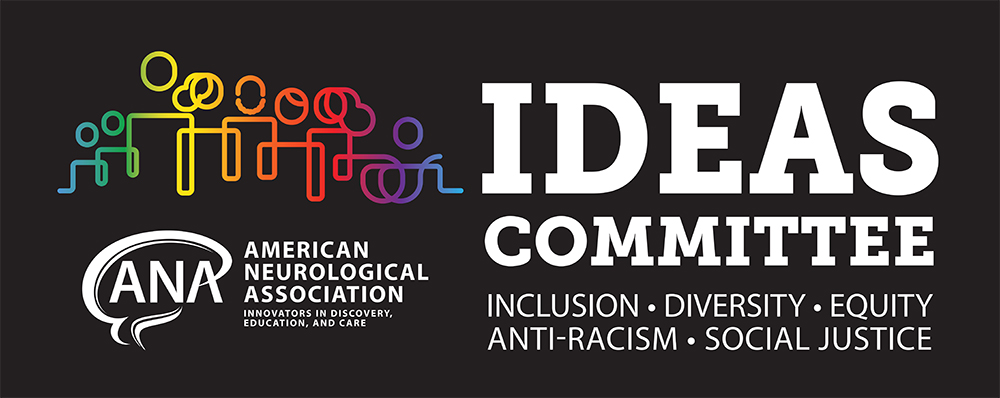Promoting justice and equity in academic neurology and neuroscience
The American Neurological Association believes that all people—across race, ethnicity, sexual orientation, gender identity, disability status, economic class, religion, national origin and more—deserve respect, empathy, and excellent neurological care. All aspiring and current neurologists deserve an academic and professional environment that is inclusive and free of discrimination so they can thrive in their chosen profession.
Systemic racism, sexism, ableism, and other forces affect access to neurologic care, the generalizability of research, and the professional prospects of aspiring neurologists and neuroscientists.
DEI Is an Urgent Priority for the ANA
- Neurological outcomes are often worse among socially disadvantaged and racially minoritized populations, in part due to disparities in access to high-quality neurological care.
- There is a shortage of neurologists, and marginalized communities are most affected.
- Patient outcomes are often better when patient and provider share a background.
- Socially disadvantaged and minoritized populations are underrepresented in academic neurology and neuroscience.
- Those same populations are underrepresented in professional neurology societies, including the ANA, and report discrimination or isolation within those organizations.
- We are still uncovering the ways neurological understanding and research have been affected by systemic biases.
Diversity, equity, and inclusion strengthen the field, the science, and most importantly, human health.
To properly understand and address neurological health in the future, academic neurology and neuroscience must welcome—and be informed by—all backgrounds and perspectives. For that to happen, academic neurology must become a more diverse and inclusive discipline and confront inequity, systemic discrimination, and unconscious bias. As the principal representative of academic neurologists and neuroscientists in the United States, the ANA is working to increase equity in neurology and neuroscience in multiple ways, including:
- Expanding opportunities for underrepresented academic neurologists to train, network, and otherwise advance their careers.
- Helping ANA members challenge bias and discrimination and improve engagement and trust.
- Addressing implicit and systemic biases within the ANA’s membership and leadership.
This work was started by Inclusion/Diversity/Equity/Anti-Racism/Social Justice (IDEAS) Task Force, established in 2020 and now continued by the Inclusion/Diversity/Equity/Anti-Racism/Social Justice (IDEAS)Committee. Below are a few examples of the work the ANA is currently undertaking.
Building the Pipeline for LeadershipCareer Resources and Mentorship for Individuals in Underrepresented GroupsThe ANA IDEAS Junior Member Award is a two-year award program that supports underrepresented in medicine (URiM) academic neurologists who are early in their careers. Recipients receive a $1,000 career development stipend, mentorship from an ANA member in their field, and complimentary registration and a travel award to attend ANA Annual Meetings. The ANA-Persyst IDEAS Professional Development Award, made possible through the Persyst Development Corporation, supports an underrepresented in medicine (URiM)* ANA member who is early in their career and specializes in epilepsy. Awardees receive an $11,500 stipend for professional development, complimentary Annual Meeting registration, and travel and lodging reimbursement to attend the meeting. * Per the AAMC's definition, this includes “racial and ethnic populations that are underrepresented in the medical profession relative to their numbers in the general population.”
|
About the IDEAS CommitteeThe Inclusion/Diversity/Equity/Anti-Racism/Social Justice (IDEAS) Committee implements the ANA’s diversity, equity, and inclusion initiatives following its Diversity, Equity, and Inclusion Strategic Plan. This includes developing new ANA policies and procedures, evaluating and recommending programs and outreach opportunities, developing best practices for our members and the field as a whole, serving as a resource and providing feedback to ANA leaders, working on DEI-related professional development and trainings, selecting award recipients, creating opportunities for dialogue within the ANA, and assessing the ANA’s progress toward its DEI goals. Learn more about the IDEAS Committee. ANA IDEAS Recruitment Suggestions for Academic Neurology Programs
Amanda Brown, PhD Nerrisa Ko, MD, MA Co-Chair, ANA IDEAS Committee Co-Chair, ANA IDEAS Committee |
Supporting Neurologic Equity Programs and ResearchThe ANA awards the Audrey S. Penn Lectureship for excellence in research, program building, or scholarship to address health care disparities and promote health equity. The award goes to an ANA member for significant work with far-reaching impact on neurologic care and outcomes, clinical program availability for medically underserved populations, or diversity in the medical workforce. The awardee receives a $2,000 honorarium as well as meeting registration, travel and lodging, and is invited to present at the ANA Annual Meeting. |
DEI Heritage & Awareness Months
- February | Black History Month
- March | Women's History Month
- May | Asian American, Native Hawaiian, and Pacific Islander Heritage Month
- June | LGBTQIA+ Pride Month
- July | Disability Pride Month
- September 15 - October 15 | Hispanic Heritage Month
- November | Native American Heritage Month

 Good IDEAS: Supporting Neurology at Morehouse
Good IDEAS: Supporting Neurology at Morehouse

